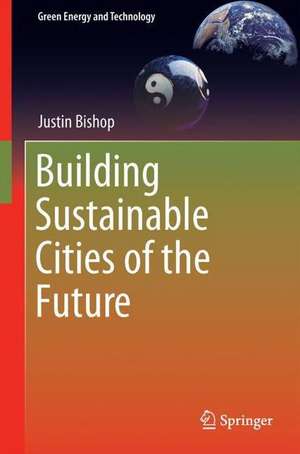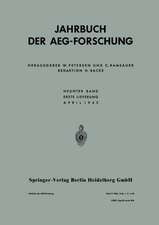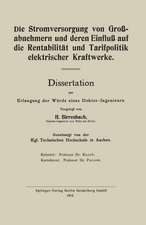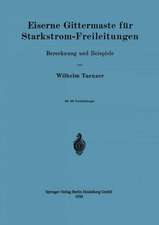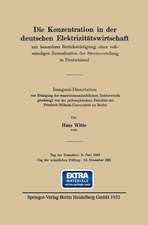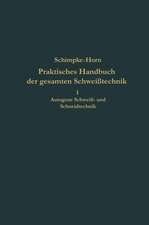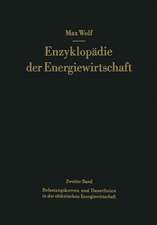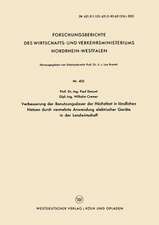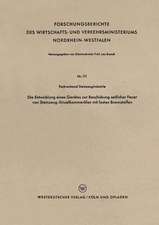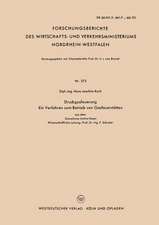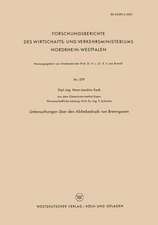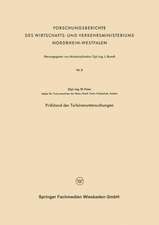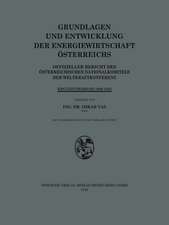Building Sustainable Cities of the Future: Green Energy and Technology
Editat de Justin Bishopen Limba Engleză Hardback – 6 sep 2017
Individual chapters cover topics such as transport, energy supply, sustainable urbanism and promoting social equality in large infrastructure projects. Real-world examples are presented to illustrate how systems thinking is used to integrate different components of a city so as to ensure that the whole is more sustainable than its parts.
Written in an accessible style, this book is intended for general readers as much as it is for students and researchers interested in sustainable cities and related topics. It is also ideal for urban planners seeking best-practice guidelines for sustainable urban development.
| Toate formatele și edițiile | Preț | Express |
|---|---|---|
| Paperback (1) | 940.09 lei 6-8 săpt. | |
| Springer International Publishing – 13 mai 2018 | 940.09 lei 6-8 săpt. | |
| Hardback (1) | 946.10 lei 6-8 săpt. | |
| Springer International Publishing – 6 sep 2017 | 946.10 lei 6-8 săpt. |
Din seria Green Energy and Technology
- 18%
 Preț: 1691.57 lei
Preț: 1691.57 lei - 20%
 Preț: 566.29 lei
Preț: 566.29 lei - 15%
 Preț: 648.24 lei
Preț: 648.24 lei - 18%
 Preț: 783.20 lei
Preț: 783.20 lei - 18%
 Preț: 961.41 lei
Preț: 961.41 lei - 18%
 Preț: 1115.46 lei
Preț: 1115.46 lei - 18%
 Preț: 944.19 lei
Preț: 944.19 lei - 18%
 Preț: 789.52 lei
Preț: 789.52 lei - 15%
 Preț: 579.81 lei
Preț: 579.81 lei - 15%
 Preț: 645.79 lei
Preț: 645.79 lei -
 Preț: 287.90 lei
Preț: 287.90 lei - 18%
 Preț: 904.60 lei
Preț: 904.60 lei - 18%
 Preț: 903.93 lei
Preț: 903.93 lei - 17%
 Preț: 490.22 lei
Preț: 490.22 lei - 18%
 Preț: 947.35 lei
Preț: 947.35 lei - 15%
 Preț: 592.61 lei
Preț: 592.61 lei - 18%
 Preț: 949.73 lei
Preț: 949.73 lei - 18%
 Preț: 1252.44 lei
Preț: 1252.44 lei - 18%
 Preț: 943.43 lei
Preț: 943.43 lei - 18%
 Preț: 1114.24 lei
Preț: 1114.24 lei - 15%
 Preț: 655.92 lei
Preț: 655.92 lei - 15%
 Preț: 643.34 lei
Preț: 643.34 lei - 24%
 Preț: 590.58 lei
Preț: 590.58 lei -
 Preț: 379.39 lei
Preț: 379.39 lei - 24%
 Preț: 634.04 lei
Preț: 634.04 lei - 17%
 Preț: 464.55 lei
Preț: 464.55 lei - 18%
 Preț: 890.54 lei
Preț: 890.54 lei - 18%
 Preț: 1112.48 lei
Preț: 1112.48 lei - 18%
 Preț: 1394.84 lei
Preț: 1394.84 lei - 18%
 Preț: 1117.03 lei
Preț: 1117.03 lei - 18%
 Preț: 957.62 lei
Preț: 957.62 lei - 18%
 Preț: 1123.15 lei
Preț: 1123.15 lei - 18%
 Preț: 952.09 lei
Preț: 952.09 lei - 18%
 Preț: 891.33 lei
Preț: 891.33 lei - 18%
 Preț: 892.11 lei
Preț: 892.11 lei - 18%
 Preț: 997.09 lei
Preț: 997.09 lei - 18%
 Preț: 789.52 lei
Preț: 789.52 lei - 18%
 Preț: 1124.92 lei
Preț: 1124.92 lei - 18%
 Preț: 1113.71 lei
Preț: 1113.71 lei - 20%
 Preț: 629.52 lei
Preț: 629.52 lei - 24%
 Preț: 1322.07 lei
Preț: 1322.07 lei - 24%
 Preț: 907.48 lei
Preț: 907.48 lei - 18%
 Preț: 952.89 lei
Preț: 952.89 lei - 18%
 Preț: 952.89 lei
Preț: 952.89 lei - 18%
 Preț: 950.52 lei
Preț: 950.52 lei - 18%
 Preț: 940.57 lei
Preț: 940.57 lei
Preț: 946.10 lei
Preț vechi: 1153.78 lei
-18% Nou
Puncte Express: 1419
Preț estimativ în valută:
181.08€ • 188.33$ • 151.75£
181.08€ • 188.33$ • 151.75£
Carte tipărită la comandă
Livrare economică 13-27 martie
Preluare comenzi: 021 569.72.76
Specificații
ISBN-13: 9783319544564
ISBN-10: 331954456X
Pagini: 300
Ilustrații: VII, 194 p. 51 illus., 49 illus. in color.
Dimensiuni: 155 x 235 mm
Greutate: 0.46 kg
Ediția:1st ed. 2017
Editura: Springer International Publishing
Colecția Springer
Seria Green Energy and Technology
Locul publicării:Cham, Switzerland
ISBN-10: 331954456X
Pagini: 300
Ilustrații: VII, 194 p. 51 illus., 49 illus. in color.
Dimensiuni: 155 x 235 mm
Greutate: 0.46 kg
Ediția:1st ed. 2017
Editura: Springer International Publishing
Colecția Springer
Seria Green Energy and Technology
Locul publicării:Cham, Switzerland
Cuprins
Introduction.- Urban air quality.- Natural resources and resource efficiency.- Transport.- Energy supply.- Water and sanitation.- Buildings.- Urbanisation, migration and social welfare.- Economy, competitiveness and innovation.- Urban planning and infrastructure.- Reducing the ecological footprint and harnessing ecosystem services.- Circular urban economy.- Resilience and robustness to impacts of climate change.- Urban infrastructure with social equity at its core.- Connected cities and measured cities.- Conclusion.
Notă biografică
Dr. Justin Bishop is a Research Associate in Transport Analysis at the Centre for Sustainable Road Freight and involved in the Energy Efficient Cities Initiative at the University of Cambridge Department of Engineering. He is also a Visiting Research Associate at the University of Oxford’s Transport Studies Unit. Formerly, he was a James Martin Research Fellow at the University of Oxford’s Institute for Carbon and Energy Reduction in Transport (ICERT).
Textul de pe ultima copertă
This book draws upon the expertise of academic researchers, urban planners and architects to explore the challenge of building the sustainable cities of the future. It addresses this challenge by considering current cities and those of the near future, and creates a picture of the sustainable city from the bottom up.
Individual chapters cover topics such as transport, energy supply, sustainable urbanism and and promoting social equality in large infrastructure projects. Real-world examples are presented to illustrate how systems thinking is used to integrate different components of a city so as to ensure that the whole is more sustainable than its parts.
Written in an accessible style, this book is intended for general readers as much as it is for students and researchers interested in sustainable cities and related topics. It is also ideal for urban planners seeking best-practice guidelines for sustainable urban development.
Individual chapters cover topics such as transport, energy supply, sustainable urbanism and and promoting social equality in large infrastructure projects. Real-world examples are presented to illustrate how systems thinking is used to integrate different components of a city so as to ensure that the whole is more sustainable than its parts.
Written in an accessible style, this book is intended for general readers as much as it is for students and researchers interested in sustainable cities and related topics. It is also ideal for urban planners seeking best-practice guidelines for sustainable urban development.
Caracteristici
Considers sustainable cities from a systems thinking perspective Provides real-world examples to illustrate the ideas presented Draws on the expertise of academics, urban planners and architects
